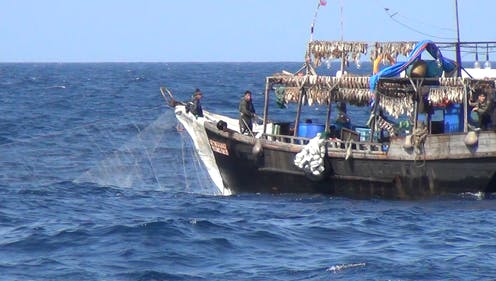…as dominant Chinese interest undervalues sector
Latest report by the Environmental Justice Foundation (EJF), has said Ghana is missing out on US$23.7 million every year in fishing license fees and fines from foreign trawlers, as lack of transparency allows Chinese fishing trawlers to keep ownership hidden.
The report, titled, ‘At what cost: How Ghana is losing out in fishing arrangements with China’s distant water fleet’, indicated that the country is substantially undervaluing its fisheries resources in nontransparent arrangements with Chinese fishing companies to license vessels under the Ghanaian flag.
The study estimated conservatively that Ghana could be generating an additional US$14.4-23.7 million annually from its trawl sector through fishing license fees and enforcement revenue for fisheries-related infringements. The country’s fisheries sector generates an estimated US$1 billion in revenue each year.
Conversely, the report said the concealment of beneficial ownership behind local front companies are reasons for the low license fees.
It identified eight Chinese companies that currently, have beneficially owned industrial trawlers operating under the Ghanaian flag, and are not paying the approved license fees. These companies accounted for 75 percent of trawlers that were licensed to fish in Ghana at the end of 2019.
In addition to low licensing revenues, Ghana is failing to apply deterrent financial penalties in accordance with minimum fines in its legislation and obligations under international law. This situation, has resulted in unrealized enforcement revenue of around US$12 million in 2015 and US$17 million in 2018.
Total licensing revenue in Ghana is insignificant compared to the landed value of catches by the industrial trawl fleet. In 2018, license fees collected from trawling companies in Ghana represented just 0.4 percent of the landed value, excluding illegal and unreported catches which are thought to be significant. Cases of apparent under-reporting of vessel tonnage for trawlers operating in Ghana have also been identified, further impacting license fees received.
In 2018, license fees collected from trawling companies in Ghana represented just 0.4 percent of the landed value, excluding illegal and unreported catches which are thought to be significant.
As a result of the lack of transparency around vessel ownership, prosecutions fail to target the beneficial owners –often a much larger entity with a controlling interest in the vessel – to ensure sanctions imposed are proportionate and have a deterrent effect.
The report identified several cases of alleged illegal fishing in Ghana linked to a Chinese state-owned corporation in receipt of government subsidies.
One state-owned Chinese company with trawl operations in Ghana, Shandong Zhonglu Oceanic Fisheries Co Ltd, reported an operating revenue of around US$164.5 million in 2019, receiving subsidies for the development of its overseas fishing operations of around US$3 million from the Chinese government in that year.
At least seven Chinese fishing companies with trawl operations in Ghana have obtained ocean fishery enterprise qualifications from the Chinese government which confer eligibility to receive state subsidies.
Meanwhile, total of 52 Ghanaian companies have held licenses for trawl vessels since 2015. The majority of local license holders reported an envisaged annual revenue of less than US$10,000 on incorporation. Nearly half of companies for which data were obtained reported an envisaged annual revenue of less than US$1,000.
The report recommends urgent reforms in Ghana’s trawl sector with emphasis on transparency, to know who is benefiting from fishing access, what and how much they are fishing, how much they are paying and what these funds are used for.
“There is a need to enhance accountability through parliamentary oversight of industrial fishing licences, as required by the 1992 Constitution, and to effectively enforce the law governing the nationality of vessel ownership set out in the 2002 Fisheries Act”, the reported recommended.










